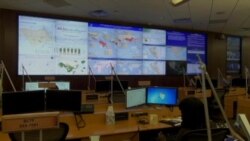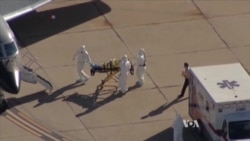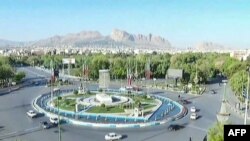ຫລາຍພັນກິໂລແມັດ ໄກຈາກພວກປະຊາຄົມທີ່ຖືກກະທົບໜັກທີ່
ສຸດ ໂດຍເຊື້ອອີໂບລານັ້ນ ບັນດານັກວິທະຍາສາດຢູ່ໃນສະຫະລັດ
ກຳລັງຂຸ້ນຂ້ຽວທຳງານ ເພື່ອຫາທາງຍັບຍັ້ງການລະບາດ ບໍ່ໃຫ້ແຜ່
ລາມອອກໄປໃນວົງກວ້າງຂຶ້ນ. ຜູ້ສື່ຂ່າວວີໂອເອ Carol Pearson
ມີລາຍງານກ່ຽວກັບເລື້ອງນີ້ ຈາກສຳນັກງານໃຫຍ່ຂອງ ສູນກາງ
ຄວບຄຸມແລະປ້ອງກັນພະຍາດຂອງສະຫະລັດ ທີ່ນະຄອນ Atlanta
ລັດ Georgia ຊຶ່ງດາຣາຈະນຳມາສະເໜີທ່ານ.
ເບິ່ງວີດີໂອ ພາສາລາວ:
ຢູ່ທີ່ສູນປະຕິບັດການສຸກເສີນ ຂອງສູນກາງຄອບຄຸມແລະປ້ອງກັນພະຍາດຂອງສະຫະລັດ ຫລື the Centers for Disease Control and Prevention ເອີ້ນຫຍໍ້ວ່າ CDC ນັ້ນ ພວກພະນັກງານ ພາກັນຕິດຕາມເບິ່ງ ໄພຂົ່ມຂູ່ດ້ານສາທາລະນະສຸກຢູ່ໃນທົ່ວໂລກ. ປີນີ້ ພວກເຂົາເຈົ້າໄດ້ຕິດຕາມເບິ່ງເຊື້ອໄວຣັສ ອີໂບລາ ນັບແຕ່ເດືອນມີນາ ມາແລ້ວ.
ໃນເດືອນກັນຍາ ສູນກາງ CDC ໄດ້ອອກການຄາດດະເນ ທີ່ພາໃຫ້ຕົກໃຈ ໂດຍກ່າວວ່າ ອາດສາມາດມີຜູ້ຄົນຫລາຍກ່ວາ ນຶ່ງລ້ານຄົນຕິດເຊື້ອໄວຣັສອີໂບລາ ພາຍໃນເດືອນມັງ
ກອນປີໜ້າ ຖ້າຫາກບໍ່ມີການເອົາບາດກ້າວໂດຍທັນທີ ເພື່ອຍຸດຕິການແຜ່ລະບາດຂອງມັນ.
ພວກນັກຊ່ຽວຊານຢູ່ສູນປະຕິບັດການສຸກເສີນ ຂອງ CDC ທີ່ນະຄອນAtlanta ສະໜອງ
ຂໍ້ມູນທີ່ສຳຄັນ ໃຫ້ພວກທີ່ຢູ່ໃນສະໜາມ ຊຶ່ງໂຮມທັງອົງການອະນາໄມໂລກ WHO ແລະບັນດາລັດຖະບານໃນປະເທດ
Liberia, Sierra Leone ແລະ Guinea ຊຶ່ງທັງສາມປະເທດເປັນຈຸດໃຈກາງຂອງການ
ລະບາດ ຂອງອີໂບລານັ້ນ.
Dr. Thomas Frieden ຫົວໜ້າ CDC ໄດ້ໄປເບິ່ງຈຸດໃຈກາງບ່ອນລະບາດຂອງອີໂບລາ ໃນທ້າຍລະດູຮ້ອນຜ່ານມາ.
Dr. Frieden ກ່າວວ່າ “ສູນກາງ CDC ແມ່ນໄດ້ໄປຢູ່ໃນພື້ນທີ່ ເພື່ອຮັບມືກັບການລະບາດຂອງອີໂບລາ ໃນທຸກໆແຫ່ງ. ແລະຂ້າພະເຈົ້າເອງ ກໍໄດ້ໃຫ້
ຄວາມໝັ້ນໃຈແກ່ ແຕ່ລະປະເທດເຫລົ່ານັ້ນວ່າ ພວກເຮົາຈະຢູ່ຄຽງຂ້າງ
ພວກເຂົາເຈົ້າ ຈົນກ່ວາມັນຈະຍຸດຕິລົງ.”
ຢູ່ໃນພວກປະເທດທີ່ຖືກອີໂບລາຄຸກຄາມນັ້ນ ປ້າຍໂຄສະນາໃຫຍ່ໆທີ່ຕິດຕັ້ງໄວ້ຢູ່ທົ່ວໄປ ປະກາດວ່າ ອີໂບລາມີແທ້. ບັນດານັກຊ່ຽວຊານດ້ານການສື່ສານຂອງ CDC ຊ່ວຍປະເທດເຫລົ່ານັ້ນ ສິດສອນປະຊາຊົນຂອງເຂົາເຈົ້າ ກ່ຽວກັບວິທີໃຊ້ຊີວິດປະຈຳວັນຢູ່ຢ່າງປອດໄພ
ແລະຄວນຈະເຮັດແນວໃດ ຖ້າຫາກໃຜຜູ້ນຶ່ງຄີງຮ້ອນເປັນໄຂ້ ຊຶ່ງເປັນຮ່ອງຮອຍຫລືອາການ
ເຕືອນອັນທຳອິດ ຂອງເຊື້ອອີໂບລາ.
ສູນ CDC ບໍ່ສົ່ງນາຍແພດ ໄປຊ່ວຍດູແລຮັກສາພວກຄົນປ່ວຍ ແຕ່ ເຝິກອົບຮົມພວກພະນັກ
ງານຮັກສາສຸຂະພາບ ກ່ຽວກັບວິທີການດູແລຄົນປ່ວຍຢ່າງປອດໄພ.
Dr. Frieden ກ່າວວ່າ “ສູນ CDC ກຳລັງເຮັດວຽກ ຢູ່ໃນທຸກໆດ້ານ ຂອງການ
ຕອບຮັບກັບອິໂບລາ ໃນທຸກໆປະເທດທີ່ມັນລະບາດ. ເຮົາຊ່ວຍພວກຄົນປ່ວຍ
ໃຫ້ໄດ້ຮັບການກວດຢ່າງຖືກຕ້ອງ. ເຮົາຊ່ວຍຕິດ ຕາມເບິ່ງການລະບາດ. ເຮົາ
ຊ່ວຍພວກປະເທດເຫລົ່ານັ້ນ ປັບປຸງວິທີ ທີ່ເຂົາເຈົ້າຮັບມືກັບມັນ ແລະພວກ
ເຮົາຊ່ວຍຄິດພິຈາລະນາວ່າ ມີສິ່ງໃດແດ່ທີ່ສາມາດເຮັດໄດ້ ເພື່ອໃຫ້ກ້າວໄປ
ຂ້າງໜ້າມັນ.”
ເຖິງແມ່ນວ່າການໄດ້ຮັບການປິ່ນປົວແຕ່ຫົວທີ ຈະຊ່ວຍເພີ້ມທະວີອັດຕາການລອດຊີວິດ
ໄດ້ຢ່າງຫລວງຫລາຍກໍຕາມ ແຕ່ມັນກໍບໍ່ມີສູນປິ່ນປົວຢ່າງພຽງພໍ ແລະຫລາຍໆຄົນໄດ້ຖືກ
ປະຕິເສດ ຖືກປ່ອຍໃຫ້ລໍຖ້າ ຫລືປ່ອຍໃຫ້ຕາຍຢູ່ທາງນອກ. Dr. Thomas Frieden
ຫົວໜ້າສູນຄວບຄຸມແລະປ້ອງກັນພະຍາດຂອງສະຫະລັດ ກ່າວວ່າ ການກໍ່ສ້າງສູນປິ່ນປົວ
ໃຫ້ມີຫລາຍຂຶ້ນຕື່ມ ແລະຮັບເອົາຄົນປ່ວຍເຂົ້າໄປຮັກສາ ແມ່ນລູກກະແຈໄປສູ່ການຢຸດຢັ້ງ
ອີໂບລາ.
Dr. Frieden ເວົ້າວ່າ “ເວລາແມ່ນສຳຄັນທີ່ສຸດ. ການເອົາບາດກ້າວໃດໆ ທີ່
ວ່າດີສົມຄວນໃນມື້ນີ້ ແມ່ນຈະດີຫລາຍກ່ວາ ລໍຖ້າການເອົາບາດກ້າວທີ່ດີ
ກ່ວາຫລາຍ ໃນອາທິດນຶ່ງນັບຈາກມື້ນີ້. ມັນຮີບດ່ວນປານ ນັ້ນພຸ້ນແຫລະ.”
ເວລານີ້ ກອງທະຫານທີ່ສະຫະລັດສົ່ງໄປຊ່ວຍ ກຳລັງພາກັນກໍ່ສ້າງ ສູນປິ່ນປົວໃໝ່ຫລາຍໆແຫ່ງ ຢູ່ໃນພວກປະເທດທີ່ຖືກອີໂບລາຄຸກຄາມ. ຄາດວ່າ ທະຫານສະຫະລັດ
ຈະເດີນທາງໄປຮອດອາຟຣິກາຕາເວັນຕົກ ຕື່ມອີກ ພາຍໃນທ້າຍເດືອນຕຸລານີ້.
Dr. Frieden ກ່າວວ່າ ທ່ານຍັງເຊື່ອໝັ້ນຢູ່ວ່າ ຈະສາມາດຢຸດການລະບາດຂອງອີໂບລາໄດ້ ແຕ່ໃນຂະນະດຽວກັນ ທ່ານກໍກ່າວວ່າ ສະຖານະການແມ່ນຈະຮ້າຍແຮງໜັກລົງໄປອີກ ກ່ອນທີ່ມັນຈະດີຂຶ້ນ.
Thousands of kilometers from the communities hit hardest by Ebola, scientists in the United States are working to stop the outbreak. VOA's Carol Pearson reports from the headquarters of the Centers for Disease Control and Prevention in Atlanta, Georgia.
This is the Emergency Operations Center at the Centers for Disease Control and Prevention - the CDC. It's here that workers track public health threats around the world. Since March, they have been tracking Ebola.
In September, the CDC issued a stunning projection: that more than a million people could get the virus by January if immediate action isn't taken to end the epidemic.
The experts at the Emergency Operations Center in Atlanta provides critical information to those in the field, including the World Health Organization and governments in Liberia, Sierra Leone and Guinea, the heart of the Ebola epidemic.
Dr. Thomas Frieden, the head of the CDC, visited Ebola's epicenter in late summer.
"CDC has been on the ground for every Ebola response. And I personally, assured each of the countries that we would be there with them until it was over."
In the Ebola-affected countries, billboards proclaim that the virus is real. CDC communications specialists help countries teach people how to stay safe and what to do if someone has a fever, the first warning sign of Ebola virus.
The CDC doesn't send doctors to care for the patients. Instead, it trains health care workers to do it safely.
"CDC is working in every aspect of the response in every country where the epidemic is present. We're helping patients get tested accurately. We're helping track the epidemic. We're helping countries improve the way they're responding to it. And we're helping to figure out what we can do to get ahead of it."
While early care dramatically increases survival rates, there aren't enough treatment centers, and many people are turned away, left to wait or die outside. Dr. Frieden says building more treatment centers and getting people into them is the key to stopping the epidemic.
"Time is absolutely of the essence. An action that is pretty good today is way better than an action that is great a week from today. It's that urgent."
U.S. troops are building new treatment facilitlies. More troops are expected to arrive in Africa in late October.
Dr. Frieden says he is still confident that the Ebola epidemic can be stopped.
But he also says it's going to get worse before it gets better.












